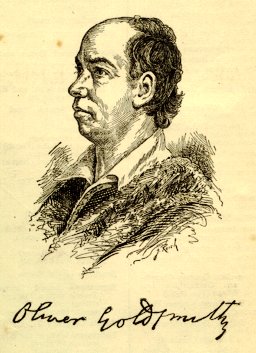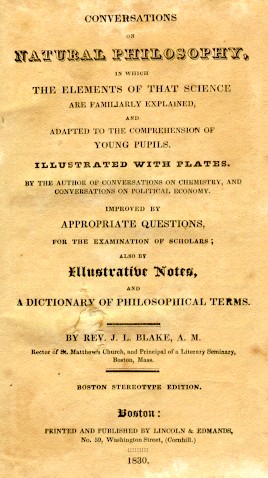Political Economy
Today, a woman guides a young friend through the early 19th century. The University of Houston's College of Engineering presents this series about the machines that make our civilization run, and the people whose ingenuity created them.
It's 1816, and a fictional teacher, Mrs. B, talks with young Caroline about political economy. Caroline has been reading the classics. She tells Mrs. B about Telemachus's return to the city of Salentum. Telemachus complains to Mentor that the city, once rich in gold and art, is now poor. Mentor replies, "Look at the farms and vineyards around the city. They now prosper."
What good is a superb city without good farms and honorable labor? It's nothing but a monster with a great head and a withered body. Mentor says they've shifted Salentum's wealth from the arts to agriculture, and they're healthier for it.
Mrs. B sighs in frustration and wheels on Caroline. "Young lady, you seriously need some grounding in modern economics."
And that's how Jane Marcet began her book on political economics. This instructional book, done in dialogue form, is one of many she wrote for the young ladies of the early 1800s.
"Flourishing cities," Mrs. B tells Caroline, "are the means of fertilizing the fields around them." How can you take wealth from the city and give it to the farm? The city and the farm form one organic whole. In the person of Mrs. B, Marcet skillfully leads Caroline away from Mentor's classic isolationism and recreates Adam Smith's arguments about economic interdependence.
But economic interdependence had another face in 1816. The female half of society was disenfranchised. When Mrs. B tells Caroline she must learn political economics, Caroline cries, "How? I cannot attend [university] lectures." Indeed she could not. Women were barred from universities in 1816.
So Mrs. B says she'll teach Caroline. She explains: "It has been my good fortune to have passed a great part of my life in a society where this science [was] a frequent topic of discussion." She has, in short, learned the way all early-19th-century women learned academic subjects. She was an alert fly on the wall.
Mrs. B launches into capitalistic theory. Caroline counters again and again with pastoral ideas from Goldsmith's poetry:
Along the lawn where scatter'd hamlets rose,
Unwieldy wealth and cumbrous pomp repose,
And every want to luxury allied.
Nonsense, Mrs. B insists. Personal wealth is a by-product of a healthy economy. It doesn't rob the poor; it helps to feed them.
Then we realize Marcet is equipping the Carolines of her male-dominated world by driving home the same aggressive economic principles that shaped that world. The publisher of the American editions of this superb and mind-churning book, this study in compromise under adversity, has falsely put the name of a male author on it. In 1816 he had to -- if he wanted anyone to buy it.
I'm John Lienhard, at the University of Houston, where we're interested in the way inventive minds work.
(Theme music)
Marcet, J.H., Conversations on Political Economy, in which the Elements of the Science are Familiarly Explained, London: Printed for Longman, Hurst, Rees, Orme, and Brown, Paternoster-Row, 1816. (This is the source in which I did most of my reading for this episode. Its frontispiece dodges the question of Marcet's gender, saying simply, "by the author of Conversations on Chemistry" -- another instructional book by Marcet.)
I looked through several later editions of Political Economy (and other Marcet books as well) at Harvard's Gutman Library. One Rev. J.L. Blake added discussion questions to her books for students in the Boston school system. The books were then sold under his name. If he altered the actual text of Political Economy in that process, it was obvious to me. Among the title pages of the many editions of Marcet's many books in the Gutman Library I saw the names of three other male authors: J.L. Comstock, Thomas P. Jones, and even Sir Humphry Davy. A typical frontispiece from a Marcet book follows:
CONVERSATIONS
on
CHEMISTRY;
in which the
ELEMENTS OF THAT SCIENCE
are
FAMILIARLY EXPLAINED
and
ILLUSTRATED BY EXPERIMENTS
AND 38 ENGRAVINGS ON WOOD
The Fifteenth American, from the last London Edition, with
Additions and Corrections
______
TO WHICH ARE NOW ADDED
Explanations of the text -- Directions for Simplifying, the
Apparatus, and a Vocabulary of Terms -- Together
with a List of Interesting Experiments.
BY J.L. COMSTOCK, M.D.
together with a new and extensive
SERIES OF QUESTIONS
BY REV. J.L. BLAKE, A.M.
______
HARTFORD
BEACH AND BECKWITH
PROVIDENCE
A.S. Beckwith & Co.
____
1835
For more on Jane Marcet see Episodes 741, 744, 745, and 828. For more on her Political Economy, see Episode 950.

From a 1911 edition of Goldsmith's The Vicar of Wakefield
Oliver Goldsmith

The title page of the 1830 edition of Jane Marcet's Natural Philosophy, attributed to J. L. Blake